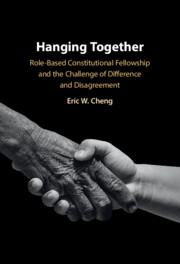 Hanging Together
Hanging Together Difference, Disagreement, and Civic Aggression
Published online by Cambridge University Press: 07 July 2022
Chapter 1 introduces the motivating problem and the central contribution of the book. The chapter begins by observing that even though difference and disagreement can be valuable for liberal democracy, their expression can “overheat,” strain liberal democratic institutions, and leave the polity vulnerable to the growing influence of autocratic political forces. The chapter posits that the more citizens share in “role-based constitutional fellowship,” the more a liberal democracy can harness the benefits of difference and disagreement while sidestepping the potential perils of difference and disagreement. Under role-based constitutional fellowship, citizens share in a culture of trust where they feel united in the general effort to preserve liberal democracy. This culture of trust can emerge because citizens (perhaps unwittingly at first) observe a division of labour; they behave in different ways, according to which spheres of activity they find themselves in and according to what normative roles they find themselves occupying within those spheres. This chapter characterizes fellowship as a “negative idealistic” perspective that lies between “deliberative” and “realist” or “agonist” conceptions of democracy.
To save this book to your Kindle, first ensure [email protected] is added to your Approved Personal Document E-mail List under your Personal Document Settings on the Manage Your Content and Devices page of your Amazon account. Then enter the ‘name’ part of your Kindle email address below. Find out more about saving to your Kindle.
Note you can select to save to either the @free.kindle.com or @kindle.com variations. ‘@free.kindle.com’ emails are free but can only be saved to your device when it is connected to wi-fi. ‘@kindle.com’ emails can be delivered even when you are not connected to wi-fi, but note that service fees apply.
Find out more about the Kindle Personal Document Service.
To save content items to your account, please confirm that you agree to abide by our usage policies. If this is the first time you use this feature, you will be asked to authorise Cambridge Core to connect with your account. Find out more about saving content to Dropbox.
To save content items to your account, please confirm that you agree to abide by our usage policies. If this is the first time you use this feature, you will be asked to authorise Cambridge Core to connect with your account. Find out more about saving content to Google Drive.